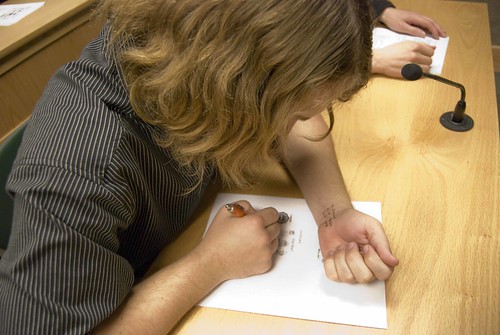

Really fascinating article - well worth reading. Students don't think it's cheating if they are using technology.
High-Tech Cheating on Homework Abounds, and Professors Are Partly to Blame
Students routinely cheat on their homework, and professors often look the other way.Photos by Ben+Sam and Mr_Stein
...
While most students and professors seem to view cheating on examinations as a serious moral lapse, both groups appear more cavalier about dishonesty on homework. And technology has given students more tools than ever to find answers in unauthorized ways—whether downloading online solution manuals or instant-messaging friends for answers. The latest surveys by the Center for Academic Integrity found that 22 percent of students say they have cheated on a test or exam, but about twice as many—43 percent—have engaged in 'unauthorized collaboration' on homework.
And cheating on an engineering problem set could be the perfect crime, in that it can be done without leaving a trace. Students in a large lecture course based on a best-selling textbook can often find the answer online, complete with all the math it took to get there.
How can a professor prove that the cheating students didn't work things out on their own?
Enter David E. Pritchard, a physics professor who teaches introductory courses at the Massachusetts Institute of Technology (when he's not in his laboratory devising new ways to use lasers to reveal the curious behavior of supercooled atoms).
Mr. Pritchard did detective work on his students worthy of a CSI episode. Because he uses an online homework system in his courses, he realized he could add a detection system to look for unusual behavior patterns. If a student took less than a minute to answer each of several complex questions and got them all right, for instance, the system flagged that as likely cheating. 'Since one minute is insufficient time to read the problem and enter the several answers typically required, we infer that the quick-solver group is copying the answer from somewhere,' he wrote in a paper last month in the free online journal Physical Review Special Topics—Physics Education Research.
He and his research team found about 50 percent more cheating than students reported in anonymous surveys over a period of four semesters. In the first year he did his hunting, about 11 percent of homework problems appeared to be copied.
Mr. Pritchard has no interest in becoming a homework cop. What he really wants to do is understand the minds of the offenders. The issue, he says, is far more nuanced than a story of "Top Students Caught Cheating." He told me that the dishonesty reveals flaws in the very way science is taught, and indicates an unhelpful spirit of "us versus them" between professors and students.
He believes that the most important part of learning physics comes by doing, and so students who outsource their homework learn little. His studies of his students prove his point. The cheaters generally perform far worse than other students come test time—students who frequently copied their homework scored two letter grades lower on comparable material on the exam.
No comments:
Post a Comment